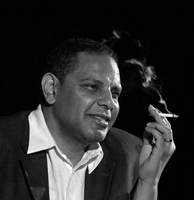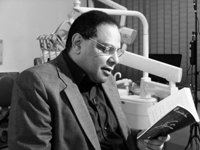
The art of fiction: making the familiar new

Internationally acclaimed Egyptian novelist
Alaa Al Aswany, author of The Yacoubian
Building. (Photo: Andrea De Meo)
Internationally acclaimed Egyptian novelist Alaa Al Aswany, author of The Yacoubian Building, an ironic depiction of modern Egyptian society, sat down with WIPO Magazine ahead of the WIPO High Level Copyright Dialogue on the Book and Publishing Industry in June 2011, at which he was a panelist, and shared his insights about the life of a fiction writer in Egypt.
Dr. Al Aswany is a practicing dentist and novelist. His literary work has attracted widespread attention and has been translated into 34 languages and published in 100 countries.
What inspired you to write?
My father was a writer and, as a child, writing was my only dream. My father told me that it would be impossible to make a living in Egypt as a writer of fiction and that I needed another profession. Even the Nobel laureate, Naguib Mahfouz had to work for the government until he retired. That’s why I became a dentist, to have another source of income.
How has being a dentist influenced your writing?
There is a very strong link between medicine and literature. They both deal with human beings. Medicine tries to cure them, while literature seeks to understand and explain human behavior through fiction. So when I work as a dentist or when I write, I don’t really feel that I am moving from one world to another. It’s the same circuit.
"Writing is like wooing a princess in a castle. You really have to prove your love, and in the end she opens the door."
It is very useful being a dentist. First, it enables me to be an independent writer, and this is very important in Egypt. As I earned my money from dentistry, I have always been free to say and write what I wanted. Secondly, as a dentist I am close to ordinary people. I’m a different kind of dentist; I give my patients all the time they need. They become friends, we drink coffee together. If when they come to the clinic they don’t feel like having treatment, we just talk. Human contact is very important and also very useful for me as a novelist.
While I don’t use the stories of my patients for my novels – that would be unprofessional - I learn from people. A novelist should always be open to people; you cannot be a novelist without loving people. Through literature, writers try to explain people’s feelings, their lives and even their mistakes without being judgmental. People, patients, even my participation in the Egyptian revolution; all these things belong to literature.
What makes a novel successful?
There is no single formula for writing fiction. Every writer has to find their own way. I keep a file with details of every character - if she is a lady, how she looks or is dressed; if she smokes, the brand of cigarettes she buys, etc. This helps me breathe life into the characters of my imagination. At some point they begin to take on a life of their own. This is when I begin writing. It’s a bit like taking good friends by the hand on a trip. It really is a very mysterious thing, but my characters become independent and, instead of me directing them on the screen of my imagination, they decide what to do and I write what I see them doing. This gives me unbelievable pleasure. It’s an unbelievable feeling to no longer be in control of your characters.
It usually takes me two to three years to write a novel, but the files of characters for three or four other novels are open at the same time. Why? Because I wait for the “click”. When the file “clicks” into place, I begin writing.
Dentistry is much easier than writing. At least in dentistry you know the rules. In writing you discover the rules as you write. You really need to love writing to be a writer, because you spend hours alone improving your technique and developing your own style. Then there is the challenge of getting your material published.
What is the importance of a publisher?
The publisher is your window. Without a publisher, readers will never get to see what you have written. That was part of my problem in Egypt during the 1990s, because I had to get published through the government and, for various reasons, they refused to publish my work on three occasions – in 1990, 1984 and 1998. Each time I paid to have 500 copies published. My work got very good reviews, but I was a known writer without readers, because people couldn’t find my work. Publishers are very important in linking authors with readers.

The third time my work was refused, I was really desperate. I even decided to quit writing and to emigrate. That was a very bad day in my life, and I was really frustrated. But as I had already started a new novel, I decided to finish it. I would print the usual 500 copies for my friends, and then leave. That novel was The Yacoubian Building … and the rest, as they say, is history. From the very first week it was a phenomenon. It sold everywhere. It changed my life.
It’s ironic really. I had been fighting to get 3,000 copies published by the government and would have been very happy with that. Today, I am celebrating the sale of one million copies of my work. But it was not easy. I really had to keep fighting. I really fought for writing, much more than for anything else.
Generally there are two elements in any fictional work. There’s the “local” element where the novelist addresses everyday social and political problems. Then there is the most important element, the human element. The challenge is to produce characters with human feelings that people can relate to. I was really very proud when I went to Norway to present my novel, Chicago, and female Norwegian readers told me they really understood the suffering of my female character, a veiled rural Egyptian woman. I think this is a very powerful aspect of literature, because it’s a really human one and this is what counts.
What makes a good author?
A novelist should know about life. Everything, every detail, is very useful to me. I read newspapers, magazines, everything, very carefully, from the women’s section - I know a lot about makeup - to the crime section. I read everything because at some point I will be writing about a female character that uses makeup and is in love. I go everywhere, to the poorest areas of Cairo, even to seedy bars. I go because I must learn about life. I deal with life, you see, so I must learn about it so that I can write about it.
In my experience, the novelist should never think about the reaction of readers when writing. If you do this, something very honest is lost. I always imagine myself writing for an invisible and powerless reader. This helps me to write what I want to write. It was hard after the big success of The Yacoubian Building. I quit writing for a whole year, because every time I sat down to write I had this success in mind.
To me a novelist is like a soldier. I wake up at 6 a.m. six days a week and am at my desk, writing, by 6.30. I write for four to six hours each day – fiction for five days, a weekly article one day a week and one day off. I write every day, adding a little each day and, in the end, I have a novel.
How important is copyright to an author?

Photo: Alaa Al Aswany
Copyright is very, very important for any writer. If we had had a more effective copyright protection system in Egypt we would have had many, many more independent writers. Thankfully, because I had another profession, I had an independent source of income, but many professional writers who absolutely have the right to live from their writing were unable to do so because of a lack of strong copyright protection.
How would you like to see copyright evolve in Egypt?
I would like to see a very efficient system of copyright protection in Egypt, one that would change the whole cultural scene. In Egypt, we have problems not only in the field of literature but also in the movie sector. Egypt has the most important movie industry in the Arab world, but suffers from a lack of copyright protection and rampant online piracy. Similarly, music producers have stopped producing albums, because they are available on-line within hours of their release.
The situation is terrible and is a real threat to all those who seek to create something for humanity. You cannot blame them for leaving the industry; it doesn't make sense to spend a lot of money on creating something and then have everybody copy your work without paying for it.
I see the issue very clearly. For poor students who need something which is not expensive, no problem. You make special allowances for them. I have given the rights to my books free of charge to all students at the Cinema Institute in Egypt. For any student who asks me, I will freely sign over the right to use one of my short stories in a study project. But I must have the authority to accept or to refuse to sign these rights over.
You cannot tell people that, because they are poor, they can take whatever they want. This is very harmful to our society. With an efficient copyright system, many more independent writers will feel secure enough to stand up for their principles. This will revolutionize Egyptian cinema and Egyptian music production. It is a must.
Has your exposure to different cultures been useful to you as a creator?
People are the most important part of my life. I really love people, and I try to understand them and not to judge them. This is very important, and it makes us much better human beings.
I went to a French school and learned French and Arabic at the same time. I also studied dentistry in the United States. I don’t believe in the clash of cultures. People are people, and we are basically all human beings with similar feelings. A mother loves her child in the same way everywhere; two young lovers have the same feelings wherever they are in the world. Everybody wants to work and raise their children and have a good family. This is very human, and I believe in that.
Who is your favorite author?
I have many but, for me, the greatest novelist in history is Fyodor Dostoyevsky; he’s a master with a very piercing, deep vision of humanity.
What advice do you have for an aspiring writer?
Stay honest. Che Guevara once said: “honor means that you always say what you think and you always do what you say”.
CJ
The WIPO Magazine is intended to help broaden public understanding of intellectual property and of WIPO’s work, and is not an official document of WIPO. The designations employed and the presentation of material throughout this publication do not imply the expression of any opinion whatsoever on the part of WIPO concerning the legal status of any country, territory or area or of its authorities, or concerning the delimitation of its frontiers or boundaries. This publication is not intended to reflect the views of the Member States or the WIPO Secretariat. The mention of specific companies or products of manufacturers does not imply that they are endorsed or recommended by WIPO in preference to others of a similar nature that are not mentioned.